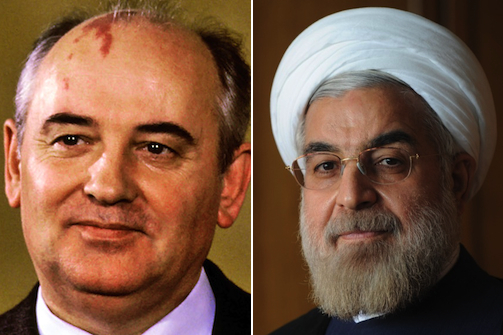Writing in the New York Times on Friday, German journalist Jochen Bittner links Iranian President Hassan Rouhani to a politician from the last days of the Soviet Union:
Mr. Rouhani knows that the Shah was overthrown 34 years ago because he had lost touch with the needs and sentiments of the Iranians. The president obviously intends to avoid the same fate. It may be premature to call Mr. Rouhani an Iranian Gorbachev. It would be worse, though, if the West recognized him as such too late.
After the interim nuclear deal agreed between Iran and the P5+1 nations — and as early as Rouhani’s inauguration in August — analysts have been askingwhether Rouhani should be compared with Gorbachev.
Bittner goes farther, however, suggesting that the US and other Western countries should take the opportunity Rouhani presents to engage with Tehran in the promotion of democratic reform:
The actual message behind all this might well be that this Iranian government is trying to find a new balance between the street and the mosque, between the secular and the sacred.
Who knows what such a new Iran might look like at the end of the process? What we do know, however, is that the revolutionary Arab states, coming from secular regimes, have so far fared badly in striking this balance. Iran is coming from the other side, and counting on reform rather than on revolution might give it a better chance.
The West, in other words, would be well-advised to engage quickly in yet another round of talks with the Iranians. But this time the focus should be not on limiting Iran’s nuclear ambitions, but on unleashing its people’s democratic aspirations.
Analyst Max Boot is more sceptical.
Writing in the LA Times during last month’s negotiations in Geneva over Iran’s nuclear programme, Boot noted the highly critical report by Ahmad Shaheed, the UN’s Special Rapporteur on Human Rights in Iran, featuring the ongoing persecution of religious minorities, “inhuman punishments such as stoning and amputation”, arrests of journalists, and continued rise in executions.
[Shaheed’s] report on Iran’s human rights violations is withering, and taken with other evidence, it provides no support for the theory that Rouhani and Khamenei are bent, as Gorbachev was, on a fundamental restructuring of a repressive system. They might be willing to temporarily suspend their nuclear program in return for sanctions relief, but there is no sign they are willing to end their cold war against the West, as Gorbachev did, which would require dismantling the entire nuclear program.
In late November, Stephen Kotkin offered another take on the comparison with Gorbachev:
In other words, to grasp in real time the immense impact of what Gorbachev was doing, one had to understand that the underlying threat to reform derived not from conservative opposition but from the system’s unreformability, and one had to surmise that Gorbachev held the opposite (erroneous) view that successful reform was possible, but conservative opposition would try to snuff it out.
…But watch for two signs. The first is rising anger and organized sabotage on the part of the conservative establishment, which would signal Rouhani’s continued attempts to have his own way. The second, and more important, is socioeconomic or political developments that go beyond the reform agenda’s putative intentions, which would signal that Rouhani had unleashed a process that he could no longer control.
See Iran Spotlight: Rouhani’s “Openness” v. Arrests for “Cyber-Crimes” & Illegal Music
For all the headline-bait of the comparison, the article pose a vital question beyond the nuclear front: will Rouhani follow up his campaign rhetoric and his administration’s initial success with a meaningful program to alleviate criticism of Iran’s democratic and human rights record.
In light of a number of high-profile arrests — 16 people for “cyber-crimes”, including at least seven staff members of the popular technology website Narenji, and the popular underground musician Amir Tataloo — the Rouhani administration may have to work harder to convince sceptical domestic and international observers of its sincerity, even with the script of a Gorbachev-esque reform initiative at hand.

